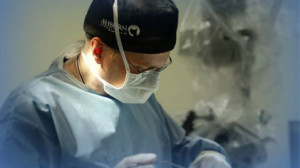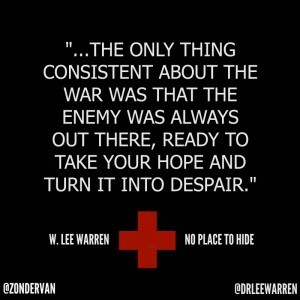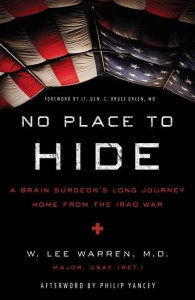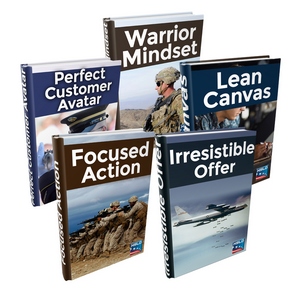 Lee Warren M.D. is the author of No Place To Hide: A Brain Surgeonís Long Journey Home from the Iraq War. He is also a brain surgeon, inventor and Iraq war veteran. Lee helps us become healthier, feel better and be happier in our lives, relationships and our businesses at www.wleewarrenmd.com.
Lee Warren M.D. is the author of No Place To Hide: A Brain Surgeonís Long Journey Home from the Iraq War. He is also a brain surgeon, inventor and Iraq war veteran. Lee helps us become healthier, feel better and be happier in our lives, relationships and our businesses at www.wleewarrenmd.com.
HSLD: Besides the little background that weíve give about you, could you tell us a little more about yourself?
Lee: Like you said, Iím a brain surgeon and a spine surgeon. I spent 14 years in the air force and 130 days of that was in Iraq, during the busy time of the war.
Now Iím in private practice, living with my family in Auburn, Alabama. I still run a full-time medical practice so I do surgery two times a week and still practice traditional neurosurgery.
I also have another company called Warren Innovation where we invent, develop and market medical instruments and devices.
I also do some online work- blogging and podcasting- trying to help people with information that will allow them to have better lives based on some of the things I know how to do, connecting them with people and growing relationships out there on the web.
Click here to listen to†Lee Warren, Author of No Place To Hide | High Speed Low Drag Podcast 41 on Stitcher
HSLD: Letís start with your success quote. What is it?
Lee: The quote that Lisa and I started our company with was actually a bible verse:
To whom much is given much is required – Luke 12:48
Iíve always thought that if youíre a person who has a lot of talents, a lot of skills or has been given a lot of blessings then you really owe the world a lot in return.
For me, Iíve been given a lot, Iíve had a lot of success and Iíve been blessed to be trained to do a lot of things so I feel like I owe it to my creator and fellow men to do the best I can and bring as much value to the world as I can.
HSLD: Letís focus on your military experience. Tell us a story of your most pivotal moment in the US army and share with us some of the lessons you learned.†
 Lee: Definitely being in Iraq as a surgeon, especially a military surgeon, the pinnacle of your experience would be to go to war and do battlefield surgery.
Lee: Definitely being in Iraq as a surgeon, especially a military surgeon, the pinnacle of your experience would be to go to war and do battlefield surgery.
We were there and that experience, in 10 hospitals, getting mortared everyday. Having the opportunity to take care of not only Americans but also Iraqi civilians, children and even the bad guys- the terrorists. And so just as a position and as a person, that was a life-changing experience for me to be in that intense environment that really, most doctors donít get to do.
HSLD: Share with us the lessons you got from that pivotal moment in your life:
Lee: The biggest thing I learned, especially as a neurosurgeon in the United States is that we have an excess of every resource available.
The biggest lesson Iíve learned is that most of us can do our jobs excellently with very little resource. We really donít have to have everything.
I learned to make the most of whatís given to me even if most of it was stripped away. That was a valuable lesson I learned from the war- to be able to do your job and maximize your success, even if you only have a little bit to start with.†
HSLD: Letís focus on your transition out and the failures, challenges and lessons you got from it.
Lee: I think my story might be a little unique. I got out in June 2005. In my case, I was deployed to Iraq right at the very end of my commitment time in the military. I got home from the war and a couple of weeks later I was out.
I had already signed a contract to join a private practice in Alabama. There was nobody in my world that knew where Iíd been a month before.
My transition was kind of abrupt and complete shock almost to me. It was a very fast and difficult transition.
I think theyíve now learned not to do that with other people, and they avoid deploying people at the end of their contract.
The lesson for me is even when you leave the military you have to try and stay attached to those that you can still contact. Maintain relationships because not only may those people be valuable to you later in life but they are also people who understand where youíve been and what youíve gone through.
HSLD: Can you share with us an AHA moment that you have had that has really spurred you on?
† Lee: The biggest one for me was in 2010 when the government passed the affordable health care act currently known as Obamacare.
Lee: The biggest one for me was in 2010 when the government passed the affordable health care act currently known as Obamacare.
Before that event, medicine in our country never really changed very much. It was always assumed that people would get sick and they would pay you for your services.
The media wonít probably tell you this but that law left physicians with salaries cut in half. At the same time it added a lot of oversight and paperwork and generally increased overhead.
The AHA moment for me was ďhey, my career is not going to continue the way I always thought it wouldĒ. We had to figure out how to continue to live and make a living.
That was the catalyst for us to change how we do things. That really opened our mind up to the idea of information marketing and online entrepreneurial endeavors and to just try to do things to still be serving people using what we know.
HSLD: What can others takeaway from your AHA moment?
Lee: Donít put your eggs in one basket. Diversify and be willing to change things, even if it seems scary.
Big things are always happening so keep your head up and keep going.
 HSLD: What is one thing that has you most fired up about your business today?
HSLD: What is one thing that has you most fired up about your business today?
Lee: The thing that Iím actually having the most fun with is writing. I never thought of myself as a writer until I started writing my memoir.
Itís a career that I never even thought about until I sat down and wrote my story.
Leeís Lighting Round Answers
- What is the most difficult adjustment you had to make to the civilian world? How fast I went from being military in the war to being a civilian.
- What business advice would you pass along to someone making the transition now? Stay connected to people from the military.
- What is one of your habits that you believe contribute to your success?
I think being a servant- doing something from someone else before expecting them to do something for you.
- If you can recommend one book what would it be? Do The Work by Steven Pressfield.
- Whatís the best way that we can find you? And one last parting piece of guidance.
Biggest piece of guidance is donít ever be afraid to fail, keep going, try something you and serve other people within your capacity.
Wleewarren.com is my website. My book is also on Amazon and Iím also starting a podcast.
